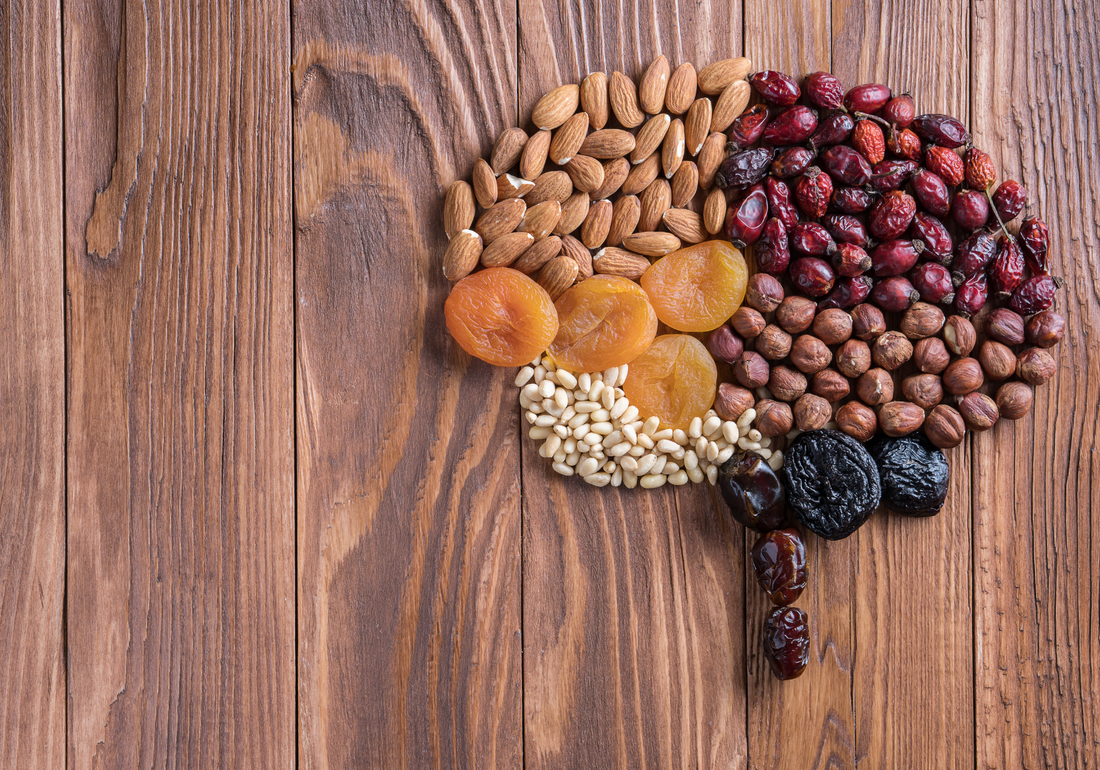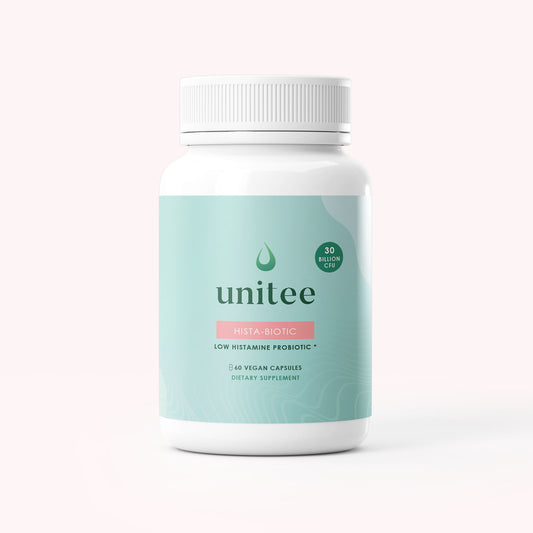Are you wondering how histamine intolerance affects your brain?
By now you’re likely aware of the effects of histamine on your overall health and how an excess of histamine is the reason behind your chronically dripping nose, digestive issues like bloating and cramps, and other irritating allergic reactions like a rash, itchy eyes and a scratchy throat.
You already know that histamine forms as part of many essential processes related to your immune response, and why the foods you eat trigger histamine, but did you know that histamine plays a crucial role in your brain, too?
Surprisingly, the histamine response in your brain that can have such a profound effect on your mood, ability to concentrate, and overall brain function. Today, you're going to discover the link that living with high histamine levels has with your sleep troubles, emotional imbalances and stress responses.
Histamine in the brain
Your brain acts as the control centre for your entire body. It is constantly receiving signals from the environment via inputs from your five senses.
The brain doesn’t simply receive and process them; it takes four complex systems, called the aminergic systems, to process the information and ensure it goes through the correct channels. One of these systems is known as the histaminergic system, which involves a histamine-mediated process.
The role of histamine here is one of homeostasis, or balance. It acts as a modulator of the stimuli received relating to (1):
- The sleep-wake cycle
- Motivation and goal seeking behaviors
- Satiety, feeding behaviors and taste perception
- Neurotransmitter regulation
- Addictive behaviors
- Memory formation
- Stress
- Pain perception
Those all seem pretty important, don’t they; and with this in mind, you can begin to paint a picture of why an increase in your histamine load affects your brain so profoundly.
But where in the brain does this happen?
The histamine found in brain tissue comes from two major pools, namely mast cells and neurons. Mast cells are relatively scarce in the brain, therefore the primary source of histamine is found in neurons.
More specifically, these histamine-releasing neurons are exclusive to just one region of the brain, known as the hypothalamus (2). It is from this location that histamine spreads to other areas of the brain.
When histamine binds to the receptors located in other brain regions, it causes an excitatory effect, one which is amplified even further during periods of wakefulness (3). This means that histamine is independently over stimulating areas of the brain.
To break down histamine in the brain and prevent this excitatory mechanism from running rampant, the HNMT enzyme (not DAO, that you’ve likely heard about so often) comes into play. HNMT breaks down histamine by forming a t-type methylhistamine, which is then broken down even further by two enzymes called monoamine oxidase B (MAOB) and aldehyde dehydrogenase (4).
Now, looking at the list of functions above, and having and idea of histamine’s importance, let’s take a deeper look at the symptoms caused by histamine in the brain.
Histamine and sleep
You already know that histamine is responsible for wakefulness, so there is little wonder why too much histamine increases the risk of sleeplessness and sleeping disorders like insomnia. It's interesting to note that more than half of all of the over-the-counter sleep aids contain a histamine receptor blocking agent, to reduce the effects of histamine in sleep disorders (5).
Histamine and motivation
Histamine plays a role in motivation and reward mechanisms in the brain (6). The association has been studied in exercise capacity, where the response to an increase in histamine increases motivation to complete tasks, and has a positive influence on goal seeking behaviors.
Histamine, hunger and eating behaviors
Hunger is a survival mechanism, which the body uses to stimulate food seeking as a means to meet the metabolic and energy demands of the body. We have known about the link between histamine and feeding cycles since the 70s - there’s a distinct inverse correlation between histamine levels and food intake. As histamine increases, so does appetite and feeding behavior (7).
Histamine and neurotransmitters
Histamine itself is an important neurotransmitter, which has an influence on other neurotransmitters (chemical messengers). This is why histamine has implications towards neuropsychiatric conditions like depression, schizophrenia and even ADHD when histamine levels are high (8,9,10).
Histamine an addictive behaviors
In studies on rats, it has been found that alcohol dependence may be influenced by higher brain histamine levels, and that therapies used to block particular brain histamine receptors may be a safe and effective treatment for alcohol abuse disorders (11).
Histamine and memory
Histamine has been shown to have a positive effect on memory, and there’s even evidence to suggest that higher brain histamine levels may offer protection against Alzheimer’s Disease (12).
This observation, of course, does not mean that the destruction caused by having overly high levels of histamine outweighs the benefits - it's simply a reminder that histamine is part of our natural body systems and plays a role in various functions, and provides a reason why histamine balance is ever so important.
Histamine and stress
Activation of the stress response has been associated with the triggering of itching; a well-known symptom of allergic and histamine reactions. While stress itself doesn’t actually cause allergies, the chemicals released into your body as a result of stress increases the production of histamine, this in turn aggravating the symptoms (13).
Stress is a big factor for everyone in our modern-day society, as we are living in a world that is so different to what our natural environment is supposed to be, and having a tough boss or certain responsibilities that we dread is something that can end up contributing to ill health. To learn more about the topic of stress and how you can manage it to ease symptoms, you can refer to our post on histamine and stress.
As you can see, histamine is involved in plenty of functions to do with the brain. Fortunately, there is something you can do about these brain-influencing actions of histamine and I'm here to tell you about it.
A low histamine diet: your most powerful weapon
By following a low histamine diet, you can reduce the amount of histamine your body has to contend with. You can download my complete guide to doing the low histamine diet correctly for free by clicking below:
In addition to this, there is another powerful way your diet can impact your histamine intolerance, and act directly on your brain.
Research has shown that a compound called nitric oxide (NO), which you can find in food, can help to inhibit the production of histamine directly in the hypothalamus (14). Nitric oxide boosting foods include:
- Beetroot (one of the best sources of dietary NO)
- Garlic
- Pomegranate
- Meat
- Nuts and seeds
Histamine has a serious and widespread effect on the body, and high levels can be debilitating, affecting every aspect of your quality of life.
The first step to getting your histamine under control is to focus on your diet, not only to remove those histamine-offending foods, but to add foods into your meals that help to break it down.
Typically, within 1-2 weeks of beginning a low histamine diet, individuals begin to see noticeable improvements in their ailments such as improved mood, sleep, focus, etc. And, the best part is you can try it for free from your own home to see if it helps!
Additionally, if you’re struggling with histamine symptoms that affect your brain, it’s essential to add these nitric oxide-rich foods to your diet. These foods can be found as part of the allowed foods in my free guide to histamine intolerance and can assist both your brain and other symptoms. Click below to get the free e-guide now!
Once you've explored a low histamine diet, improvement of symptoms can be a convincing argument for being histamine intolerant, at which time it's important to begin educating yourself on the available therapies for the disorder.
Keep in mind, although histamine intolerance is not widely known about by healthcare practitioners, more and more professionals are becoming educated on the topic, which is making research increasingly plentiful.
Additionally, histamine itself is a very common compound that is a natural part of your immune system. So, there is plenty of research available on how to modulate histamine levels in the body which can be applied to improving symptoms of a histamine intolerance.
If you have verification of your histamine intolerance and have been searching for a histamine intolerance treatment, have a look at this post next on how I solved my histamine intolerance using evidence-based therapies which have now been used by thousands of clients to achieve similar results.
References:
Brown, R. E., Stevens, D. R., & Haas, H. L. (2001). The physiology of brain histamine. Progress in Neurobiology, 63(6), 637–672. https://www.sciencedirect.com/science/article/pii/S0301008200000393
Shan L, et al. Interactions of the histamine and hypocretin systems in CNS disorders. Nat Rev Neurol . 2015;11(7):401–413. https://www.ncbi.nlm.nih.gov/pubmed/26100750
Bolam, P., & Ellender, T. Histamine and the striatum. Neuropharmacology. Volume 106, July 2016, Pages 74-84. https://www.sciencedirect.com/science/article/pii/S0028390815300599#bib5
Haas HL, et al. Histamine in the nervous system. Physiol Rev . 2008;88(3):1183–1241. https://www.ncbi.nlm.nih.gov/pubmed/18626069
Naganuma F, et al. Histamine N-methyltransferase regulates aggression and the sleep-wake cycle. Sci Rep . 2017;7(1):15899. https://www.ncbi.nlm.nih.gov/pubmed/29162912
Loy, B. D., & O’Connor, P. J. (2016). The effect of histamine on changes in mental energy and fatigue after a single bout of exercise. Physiology & Behavior, 153, 7–18. https://www.sciencedirect.com/science/article/abs/pii/S0031938415301463
Provensi G., et al. (2016) Histamine and Appetite. Histamine and Appetite. In: Blandina P., Passani M. (eds) Histamine Receptors. The Receptors, vol 28. Humana Press, Cham. https://link.springer.com/chapter/10.1007/978-3-319-40308-3_15
Sadek, B., et al. Histamine H3 receptor as a potential target for cognitive symptoms in neuropsychiatric diseases. Behavioural Brain Research. Volume 312, 1 October 2016, Pages 415-430. https://www.sciencedirect.com/science/article/pii/S0166432816304168
Silk, T. Chapter 13 - New Frontiers: Neurobiology of Sleep in ADHD. Sleep and ADHD: An Evidence-Based Guide to Assessment and Treatment. 2019, Pages 331-353. https://www.sciencedirect.com/science/article/pii/B9780128141809000132
Ellenbroek, A., et al. Do Histamine receptor 3 antagonists have a place in the therapy for schizophrenia? Current Pharmaceutical Design, Volume 21, Number 26, 2015, pp. 3760-3770(11). https://www.ingentaconnect.com/content/ben/cpd/2015/00000021/00000026/art00007
Panula, P. Histamine, histamine H3 receptor, and alcohol use disorder. British Journal of Pharmacology. 2019. https://bpspubs.onlinelibrary.wiley.com/doi/abs/10.1111/bph.14634
Zlomuzica, A., et al. 2016. Neuronal histamine and cognitive symptoms in Alzheimer's disease. Neuropharmacology. 106, 135e145. https://www.sciencedirect.com/science/article/pii/S0028390815001884?via%3Dihub
Kim, H., et al. How stress triggers itch: a preliminary study of the mechanism of stress‐induced pruritus using fMRI. International Journal of DermatologyVolume 55, Issue 4. 2015. https://onlinelibrary.wiley.com/doi/abs/10.1111/ijd.12864
Prast, H., et al. 1996a. Histaminergic neurons facilitate social memory in rats. Brain Res. 734, 316–318. https://www.sciencedirect.com/science/article/pii/0006899396008864

Anita Tee
My name is Anita Tee. I'm a nutritional scientist who specializes in histamine intolerance. I hold a Master of Science in Personalized Nutrition and a Bachelor of Science in Human Biology and Psychology.For the past ten years, I have used my experience in nutritional and medical health sciences to create a scientifically backed, natural approach to healthcare that relies 100% on evidence-based research.As I previously suffered from - and overcame - histamine intolerance, my focus is to increase recognition and expand the available resources and protocols available for resolving this particular disorder. To date, I have helped over 4,000 individuals fully resolve or better manage their histamine intolerance symptoms.







